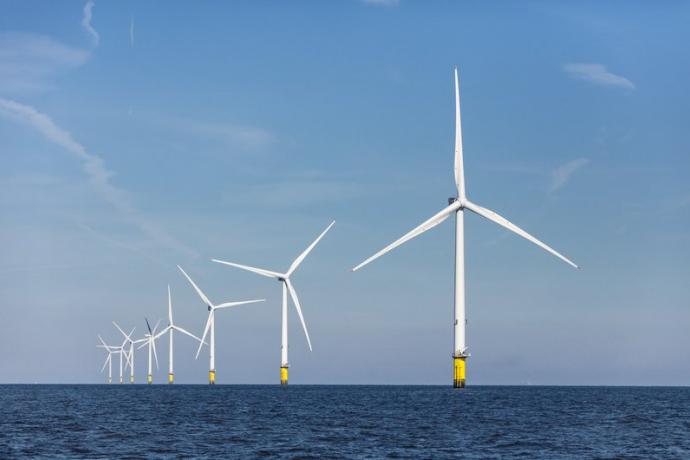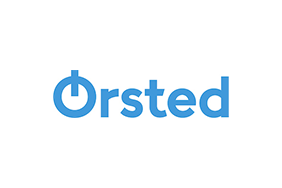Here’s Why It Makes Sense for Companies to Support Climate-related Disclosure
Ørsted, the global leader in offshore wind, supports the Task Force on Climate-Related Financial Disclosures. We explain why the TCFD matters to our business "“ and to the wider private sector.
Published 11-15-18
Submitted by Ørsted
 Ørsted offshore wind park at Burbo Bank Extension, in Northwest UK
Ørsted offshore wind park at Burbo Bank Extension, in Northwest UKMainstream investors are increasingly conscious of the impacts of climate change and they want to know how companies disclose and manage climate-related risks. The TCFD provides recommendations that aim to meet investors’ demand for just such information.
By adopting the recommendations, companies signal they are considering, and reacting to, the impacts of climate change on their business. It is an important first step in helping the market to allocate capital in ways that drive the transition towards a sustainable, low-carbon economy.
Ørsted ranks among the world’s largest green energy developers, and we want to help create a world that runs entirely on green energy. We recently joined around 500 other companies in expressing support for the TCFD.
Jeppe Hoff Nielsen, VP of Reporting & Accounting Excellence, and Rasmus Skov, Head of Group Sustainability, tell us why the TCFD matters to Ørsted and to the wider private sector.
Why is Ørsted supporting the TCFD?
Jeppe Hoff Nielsen: Ørsted has transitioned from being one of the most coal-intensive utilities in Europe, to a renewable energy company with a global footprint. Since 2006, we have reduced carbon emissions by 67 percent, while our green energy generation has risen to 71 percent. By 2023, we will be virtually carbon free and generating at least 95 percent green energy. In the past five years alone, we have invested more than USD 9bn in green energy.
The TCFD recommendations help us continuously improve our understanding of climate-related financial risks and opportunities and disclose it in a useful way to our investors. The recommendations help us address the gap between our current approach to financial reporting and what more investors would like to know from us in the future.
We have begun our work on TCFD reporting. It is important work, and we should just get started rather than wait for perfection.
How do you work to close gaps to align with the TCFD?
Rasmus Skov: In Spring this year, we conducted a gap analysis to shed light on how far our current reporting and practices are from TCFD alignment. The analysis showed that we are aligned with the TCFD to a large extent. However, we still have important gaps to close, including better reporting on scenario analysis and scope 3 emissions.
To evaluate and implement relevant gaps, we’ve established an internal working group consisting of six different departments. The implementation work is rooted in the Finance organisation while Group Sustainability supports the process by maintaining an overview and coordinating between the different functions that need to work together.
Is TCFD changing the way you work?
Rasmus Skov: The energy sector contributes around one-third of global carbon emissions. As a global community, we need to accelerate the transition away from fossil fuels to renewable energy, to limit climate change and help make the planet a greener and more prosperous place for everybody.
At Ørsted, we realized that fossil-based energy production was not going to make us successful in the long term. That triggered actions that today help rank us among the world’s 100 most sustainable companies.
This is exactly the kind of thinking and action that TCFD advocates. Their guidelines inspire us to think even more comprehensively about our approach and reporting on exposure to climate risks. Our internal, cross-functional working group comprising of finance and sustainability functions will help to implement the TCFD recommendations.
Is TCFD good for business?
Jeppe Hoff Nielsen: We believe that the private sector needs to be a key driver in the transition to a world that runs entirely on renewable energy. The TCFD recommendations can guide companies towards running more sustainable and climate-resilient businesses, while the resulting disclosures can help investors take climate-related risks into account and avoid stranded assets.
However, TCFD is more than just an exercise in risk management. It’s a means to examine opportunities that make companies resilient to the challenges of climate change, and to help them respond to climate threats with climate action.
--------------
Quick facts:
Ørsted develops, constructs and operates offshore and onshore wind farms, bioenergy plants and innovative waste-to-energy solutions, and provides smart energy products to its customers. The group’s revenue was DKK 59.5 billion (EUR 8.0 billion), in 2017.
More than 500 companies with a combined market capitalization of USD 7.9 trillion have so far expressed their support for the TCFD. That includes banks, asset managers and insurance companies, as well as non-financial sector players such as chemicals, energy and utilities companies.
The Task Force is the first industry-led initiative to bring climate-related financial reporting to a mainstream audience.

Ørsted
Ørsted
The Ørsted vision is a world that runs entirely on green energy. Ørsted develops, constructs and operates offshore and onshore wind farms, solar farms, energy storage facilities, and bioenergy plants, and provides energy products to its customers. Ørsted ranks #1 in Corporate Knights' 2020 index of the Global 100 most sustainable corporations in the world and is recognised on the CDP Climate Change A List as a global leader on climate action. Headquartered in Denmark, Ørsted employs 6,600 people. Ørsted's shares are listed on Nasdaq Copenhagen (Orsted). In 2019, the group's revenue was DKK 67.8 billion (EUR 9.1 billion).
More from Ørsted

